18 Dec 2024
Why Custom ERP Software Development is a Smart Investment for Growing Businesses
Matthew Connor
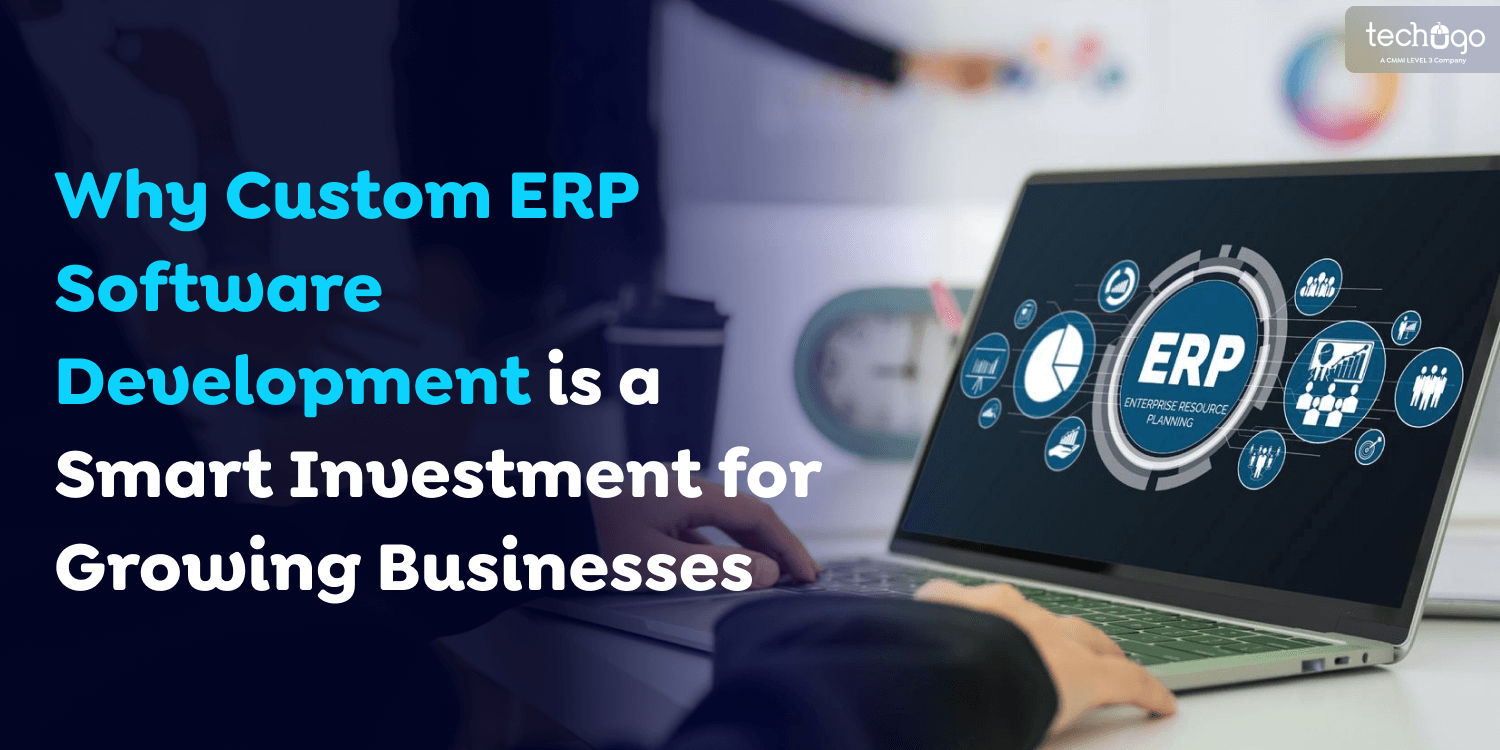
If you’re facing challenges with disconnected systems, inefficient workflows, or limited access to real-time data, ERP software development can offer a solution. Implementing a custom ERP system enables you to centralize core business functions—from finance to supply chain management—helping eliminate manual tasks and boosting process efficiency.
In 2022, the global ERP software market was valued at approximately USD 54.76 billion, and it is anticipated to grow at a compound annual growth rate (CAGR) of 11.0% through 2030, as reported by Grand View Research.
ERP systems provide you with the control and insights needed to make informed decisions and drive business growth.
Custom ERP software could be the right choice for overcoming operational challenges and scaling effectively. This guide covers the essentials of ERP, the development process, and what to expect in terms of development costs.
Why ERP Software is Essential for Modern Business Operations
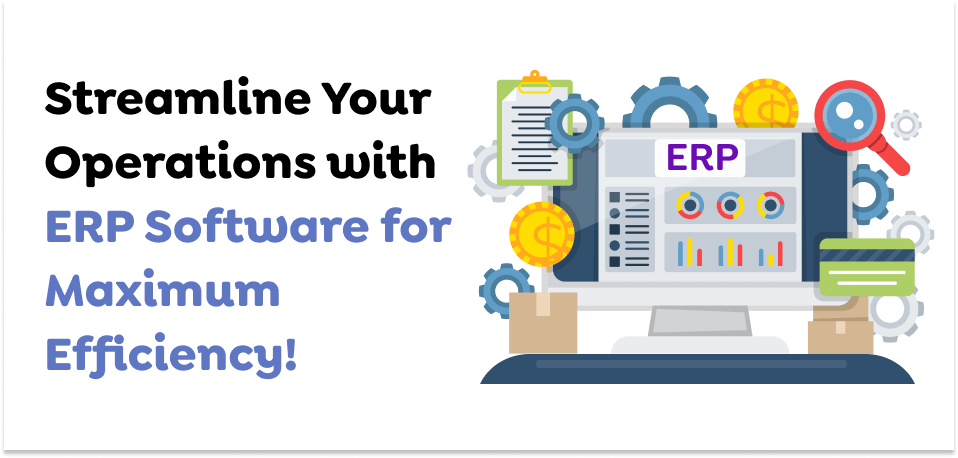
Enterprise Resource Planning (ERP) systems are comprehensive software solutions designed to integrate and automate critical business functions, including finance, supply chain, human resources, procurement, manufacturing, and sales. One key benefit that ERP solutions present is the capacity to integrate and enable all different levels of an organization while supplying a common digital environment to key departments. It eliminates the problems of isolated applications, which are linked to poor coordination, enhancing cooperation between various areas of the business to provide an efficient operation system.
Moreover, ERP software refers to a centralized system that supports all a company’s business processes and offers real-time information that supports better decision-making and efficient business procedures. While enabling efficient organization and accurate information management, ERP applications allow for increased organizational efficiency and optimized workflow. In the case of custom ERP software development, the ERP systems can be integrated to correspond to specific business needs and thus experience massive advantages such as scalability and adaptability and, most importantly, definitive competitive advantage.
Let’s explore how custom ERP development can transform business efficiency and drive growth.
Also Read : How Much Does It Cost to Hire Software Developers: A Comprehensive Guide
What is Custom ERP Software Development, and Why Is It Important?
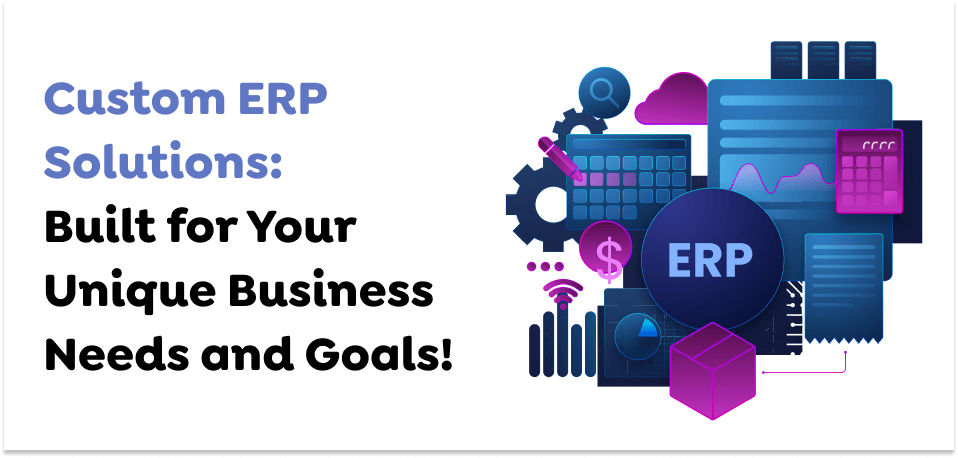
Custom ERP software development is an approach to developing ERP software that will best suit your firm’s needs and processes.
Developing your ERP system entails integrating different technologies such as artificial intelligence, machine learning, microservices architecture, and cloud. Such tools help design a highly individualized environment suitable to an organization’s requirements and incorporate certain options.
For example, a custom ERP system in a retail company can include features such as inventory control, supply chain automation, and real-time sales information that would assist the company in growing and making wise decisions.
By integrating an optimized ERP system in-house, an organization collaborating with an ERP software development company can improve business operations, increase business productivity, and address correlated tasks more efficiently.
Now, let’s explore why investing in custom ERP software is a smarter choice than opting for off-the-shelf solutions.
Customized ERP vs. Off-the-Shelf ERP: Which Is Right for Your Business?
Custom ERP: Tailored for Your Business Needs
-
Flexibility and Modularity:
Custom ERP systems are highly adaptable, allowing the addition or removal of modules and seamless integration with other tools.
-
Long-Term Value:
Though initial costs and development time are higher, the personalized approach minimizes the need for future modifications and ensures long-term benefits.
-
Competitive Advantage:
Customized systems align perfectly with your business strategies, optimizing workflows and enhancing market competitiveness.
-
Control Over Maintenance:
Organizations often manage technical support internally or hire third-party developers, giving complete control over updates and maintenance.
Off-the-Shelf ERP: A Ready-Made Solution
-
Quick Implementation and Lower Costs:
Packaged software is preprogrammed for standard functions, enabling faster setup with reduced upfront costs.
-
Limited Customization:
While cost-effective, customization options are limited, and restrictions may prevent future modifications.
-
Hidden Costs:
Less expensive ERPs often have additional costs for upgrades, third-party integrations, or workarounds.
-
Dependency on Vendors:
Businesses rely on the vendor’s update cycle for new features and support, potentially limiting flexibility.
Also Read : How Much Does It Cost to Develop Church Management Software?
7 Essential Features to Include in ERP Software Development

When developing an ERP system, selecting key features that align with your business needs is vital. Here’s a look at seven essential features to include during the ERP software development process:
1. Seamless Integration Across Systems:
A core feature in custom ERP development is integration, allowing various business functions—such as finance, operations, and data management—to work cohesively. This unified view enhances workflow efficiency and simplifies managing cross-functional activities.
2. Process Automation for Enhanced Productivity:
Due to the automation of tasks, the use of ERP solutions allows for avoiding the emergence of a large number of routine works that increase the load on employees and do not always provide a high level of work. Automating processes frees up employees to focus on strategic initiatives, boosting productivity and overall operational effectiveness.
3. Robust Data Management and Analytics:
Custom ERP systems with data management protocols ensure data integrity, security, and accessibility. These features enable companies to capture and store information and make useful, informed decisions for company security in the event of data leaks and thefts.
4. Customer Relationship Management (CRM) Integration:
ERP systems with integrated CRM functionalities offer a comprehensive view of customer interactions and business operations. By using technologies to automate CRM processes, firms can improve the delivery of customer services, better manage CRM interactions, and satisfy customers.
5. Efficient Supply Chain Management (SCM):
ERP solutions facilitate ‘supply chain management’ functions that otherwise could take extensive time to execute, such as inventory management, order procurement, and stock distribution. This means that real-time results will allow the organization to strive to improve the effectiveness and efficiency of the supply chain.
6. Scalability for Business Growth:
Integrated and adaptable ERP also allows firms to grow with their ERP system as the business grows and as more functions are added to the system. In particular, a scalable ERP is more suitable for organizational growth since it can be adapted for a company’s needs and requirements.
7. Ongoing Support and Maintenance:
A company-specific ERP system often needs configuration, updates, and other support to receive its highest rating. Effective technical support helps to maintain the system effectively, contemporaryly, and in working condition for as long as possible, hence delivering on its potential for the benefit of the business.
By incorporating these essential features, ERP software development creates a solution tailored to enhance efficiency, facilitate growth, and provide the flexibility needed to adapt to changing business needs.
Now, let’s explore the six essential steps for an ERP software development process that can guide you through a seamless implementation from start to finish.
Also Read : How Artificial Intelligence Software is Transforming Modern Business Practices
6 Essential Steps for a Smooth ERP Development Process
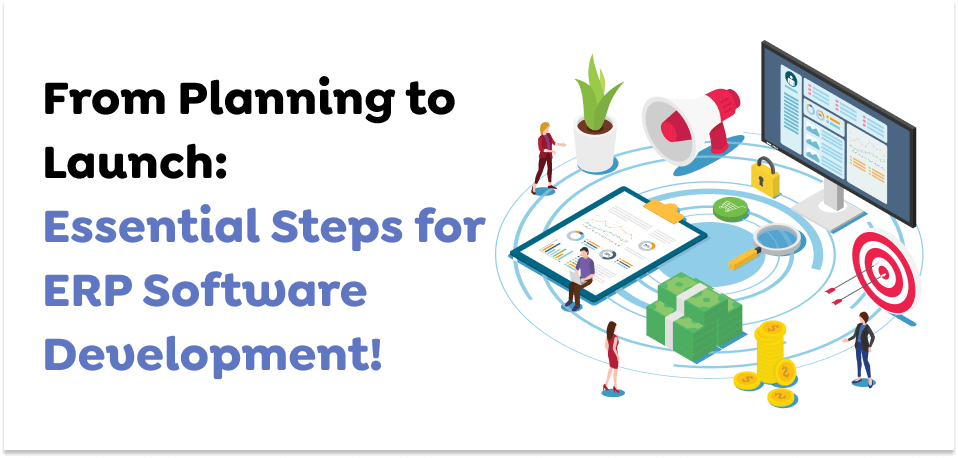
To ensure the successful development of an ERP system, it’s important to follow a well-structured approach. A clear process helps integrate all necessary features and ensures that the system is tailored to meet your business’s specific requirements. Here are the key steps that form the foundation of an effective ERP development process:
Step 1: Define Goals and Requirements
Understanding your business’s unique needs and challenges is the foundation of ERP development. To obtain information before the implementation of the project, stakeholders should convene a meeting to come up with a clear understanding of the fundamental aspirations of ERP. When creating documentation outlining your needs, the development team will be better equipped to create a solution that would fit the business in question and would eliminate operational problem areas.
Step 2: Design User-Friendly UI/UX
UI/UX design is crucial for correct and effective interaction with an ERP system. Concern with top-quality, clean design that enables employees to easily transition between various modules. In addition to good design, it is essential to integrate data visualization solutions into design that help in real-time analytics and decision-making processes as well as organizational effectiveness.
Step 3: Select the Right Tech Stack
The selection of the right technology stack is critical for the system’s future performance, growth, and expansion. The development team will choose the platform, programming language, database, and cloud that your business’s specific needs require. The technology choices guarantee the current system’s efficiency and productivity and also allow for expansion to accommodate growth.
Step 4: Build the ERP System
With the design and tech stack in place, the development team begins building the ERP system, starting with the core features and modules. This phase typically follows an agile methodology, allowing flexibility as business requirements change over time. The system is gradually enhanced, with the MVP (Minimum Viable Product) focusing on immediate, high-priority needs.
Step 5: Testing and Quality Assurance
Testing ensures that the ERP system meets both functional and technical requirements. A quality assurance company typically conducts system and acceptance testing, feature and component testing, as well as unit and integration testing to detect bugs, misuse cases, and performance problems. Additionally, testing within this phase ensures the highest quality in implementing the ERP system, confirming that it is safe and runs efficiently in actual operations.
Step 6: Deploy the ERP System
Deployment involves moving the fully developed ERP system into a live environment. This stage includes installation, configuration, and data migration from legacy systems, ensuring all business operations run smoothly. After implementation, follow-up is conducted to ensure any problems or challenges are resolved, hence maintaining the success of the system.
Moving forward, let’s explore the key advantages of developing ERP software and how it can transform your business by streamlining operations, enhancing decision-making, and driving growth.
Also Read : How Veterinary Practice Management Software Boosts Clinic Efficiency and Care
Key Advantages of Developing ERP Software
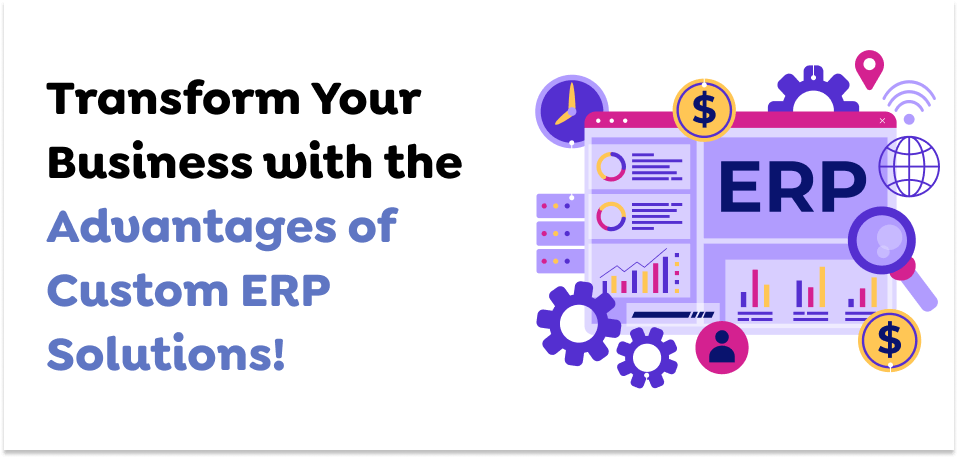
Implementing ERP software can have a transformative impact on an organization, improving various aspects of its operations. From enhanced productivity to better data security, the benefits of ERP systems extend across industries. Below are some key advantages that come with developing a customized ERP solution.
-
Enhanced Productivity:
An organization-specific ERP minimizes manual and time-consuming activities, such as invoicing or inventory management, directing employees to perform strategic tasks. Integrating individual operational procedures, an ERP system promotes enhanced performance and productivity of the various business units.
-
Improved Collaboration:
If an organization has an ERP system, all the teams in different departments can collaborate in real-time.
-
Real-Time Data Insights:
An ERP system brings together all records related to the business and provides real-time information on the business’s operations. As a result, this allows the reporting to be precise, regardless of the volume and density, and across all departments. That way, decision-makers are in a better position to make the right business decisions because they have current data.
-
Scalability and Growth:
ERP solutions are built to expand along with your enterprise. ERP systems are learning systems, and as the organization grows big and develops new processes, hence new workflows and new users, the ERP systems can reflect this. Thus, businesses can easily integrate essential features and new resources into cloud-based ERP solutions, making them highly adaptable.
-
Enhanced Data Security:
Security is always paramount when implementing ERP systems, especially when business data needs protection. Developers design new ERP solutions to prevent information leakage and ensure companies comply with legal requirements. These solutions inherently provide security, ensuring data accuracy and protecting against potential attacks.
-
Cost Optimization:
Another advantage associated with implementing an ERP system is the definition of potential cost savings. Thus, it is easy for a firm to reduce business operational costs by enhancing its operations. ERP systems eliminate duplicate work and costs, serving as crucial sources of long-term cost savings.
Let’s discover the cost factors involved in building a customized ERP software solution and how they can impact your business’s budget and long-term success.
Also Read : Why Your Business Needs Manufacturing Inventory Management Software for Growth?
Cost of Building a Customized ERP Software Solution
The cost of building a customized ERP software solution can vary significantly depending on several factors, including the complexity of the features, the size of the organization, the technology stack used, and the development timeline. Custom ERP development deals with the enhancement of a particular software to address business requirements, and this process demands a thorough understanding of the company’s processes. Moreover, continual commenting, compatibility with current frameworks, and flexible expansion possibilities can affect the costs. Finally, long-term benefits of the investment include improved business processes, better data handling capability, and improved decision-making for companies that adopt a custom ERP solution.
Also Read : The Complete Guide to Developing Clinical and Patient Decision Support Software
How Techugo Can Assist in Your ERP Software Development Needs
Techugo, a leading mobile app development company, specializes in creating customized ERP solutions tailored to meet the unique needs of businesses across various industries. With a focus on enhancing operational efficiency, scalability, and data security, Techugo leverages advanced technologies and a collaborative approach to design and develop ERP systems that streamline processes, improve productivity, and support business growth. Their team of experienced developers and strategists works closely with clients to deliver a solution that not only fits current requirements but also adapts seamlessly to future business needs. Whether you’re looking to optimize your workflows or ensure robust data management, Techugo provides end-to-end ERP software development services that drive success.
Also Read : Renewable Energy Software: Transforming the Future of Sustainable Energy Practices
Conclusion
Custom ERP software development is, without a doubt, a powerful solution for businesses looking to streamline operations, improve collaboration, and make data-driven decisions. By investing in an ERP system tailored to your specific needs, you can not only optimize workflows but also enhance productivity and scale your organization effectively. Moreover, as ERP systems continue to evolve, integrating cutting-edge technologies like AI and cloud platforms, they offer even greater flexibility and scalability. Consequently, this positions your business for long-term growth and success, ensuring you stay ahead in an increasingly competitive market.
While the process of ERP software development may present challenges, such as integration and data migration, the long-term benefits far outweigh the initial obstacles. With the right ERP system, businesses can significantly improve efficiency, effectively reduce costs, and consistently maintain a competitive edge in an ever-changing market. Furthermore, by carefully considering the specific requirements and thoughtfully selecting a trusted development partner, you can seamlessly unlock the full potential of ERP software for your organization.
Get in touch with us today to discuss how ERP software development can streamline your operations and drive growth.
Get In touch
We are excited to here from you and let’s start something special Together. Call Us for any inquiry.
Write us
sales@techugo.caJust a call away
About you




